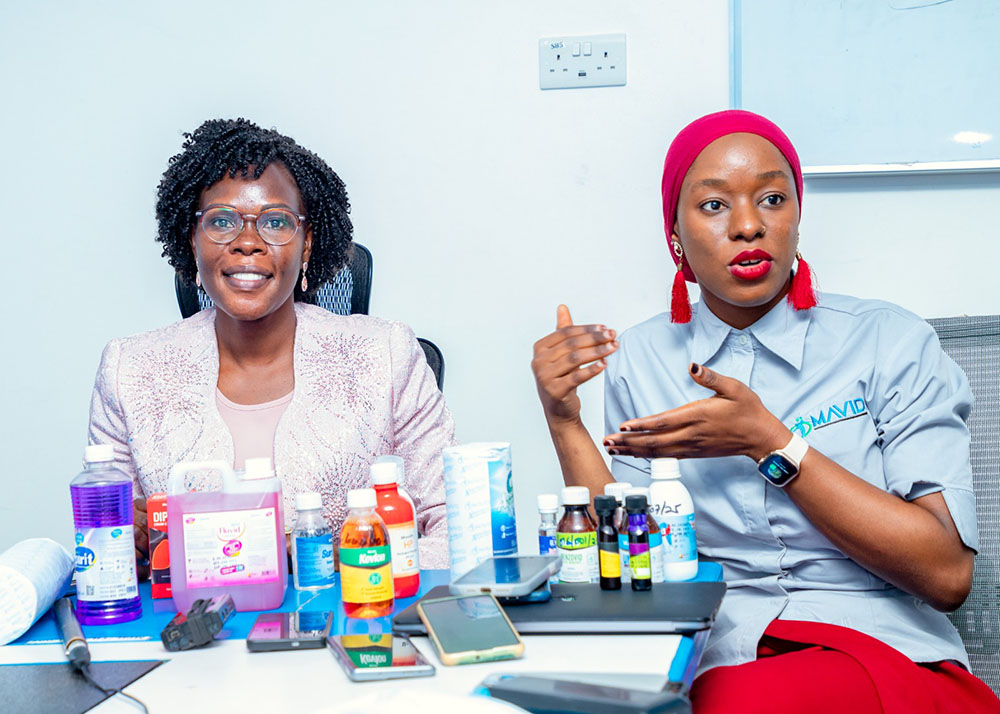Uganda pledges incentives to boost homegrown drug industry
Anite acknowledged that many pharmaceutical plants are not in industrial parks, which are a prerequisite for some government support. She pledged to move Mavid into one, providing them with free land and other benefits.
State Minister for Investment Evelyn Anite (centre) emphasised the government’s commitment to supporting the growth of local companies. Looking on is Dr. Aisha Bukenya, head of Mavid Pharmaceuticals, during the minister’s visit to the company’s plant in Kajjansi, along Entebbe Road on Thursday. (Courtesy Photo)
WAKISO - The Government has reiterated commitment to fast-tracking support for local pharmaceutical manufacturers, promising special incentives and infrastructure to help them expand and reduce the country's reliance on imported medicine.
Investment state minister Evelyn Anite made the promise during a visit to Mavid Pharmaceuticals, a local plant producing essential medical supplies in Kajjansi along Entebbe Road on Thursday, August 21, 2025.
"It is a very exciting day for me," Anite said, emphasising that the Government is committed to helping companies like Mavid grow.
Anite acknowledged that many pharmaceutical plants are not in industrial parks, which are a prerequisite for some government support. She pledged to move Mavid into one, providing them with free land and other benefits.
"We have to move this pharmaceutical manufacturing plant to an industrial area and therefore provide them with this free land that we give," she explained.
Dr. Aisha Bukenya (right) briefs State Minister for Investment Evelyn Anite on the range of products manufactured at the Mavid Pharmaceuticals plant in Kajjansi, along Entebbe Road in Wakiso, during the minister’s visit on Thursday. Dr. Bukenya praised the National Drug Authority (NDA) for its support in helping the company meet high standards, but noted that the high cost of importing raw materials remains a major challenge. (Courtesy Photo)
The minister also promised to introduce Mavid to the President to secure further support and to facilitate agreements with the National Medical Stores (NMS) to ensure local products get into the national supply chain. Anite urged Ugandans to support local products, assuring the public that they are certified by the National Drug Authority (NDA) and the Uganda National Bureau of Standards (UNBS).
"When you buy this product... you are actually contributing to the welfare of the people they have employed," she said, highlighting the economic benefits of buying locally.
Available records indicate that Uganda spends over Sh1.3 trillion annually on importing medical and pharmaceutical products.
Cognizant of the impact this has on the country, including the depletion of foreign exchange reserves, President Yoweri Museveni has repeatedly called for the establishment and strengthening of local pharmaceutical manufacturing.
Dr Aisha Bukenya, the lead at Mavid Pharmaceuticals, underscored the critical need for this support. She pointed to Uganda’s heavy dependence on imported medical supplies, a vulnerability that was starkly exposed during the COVID-19 pandemic.
"Health is not something you can rely on external suppliers for," Bukenya said.

"During COVID, we all saw what happens when every country fends for itself. We must build our local capacity."
Mavid Pharmaceuticals, which manufactures products ranging from surgical spirits to Mama Kits for expectant mothers, is a key example of this local capacity.
Bukenya praised the NDA for its guidance in helping the company meet high standards, but noted that a major challenge remains: the high cost of importing raw materials.
"Uganda currently does not manufacture active pharmaceutical ingredients," she explained. "If we had that capability, medicines would be significantly cheaper."
With the right government support—including infrastructure, incentives, and procurement guarantees—Dr. Bukenya is confident that Mavid can introduce more life-saving products and strengthen Uganda’s pharmaceutical independence.
She believes the company can be a model for others under the Buy Uganda, Build Uganda (BUBU) initiative.